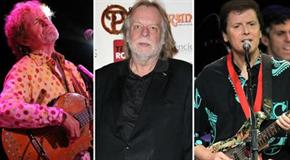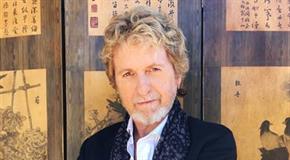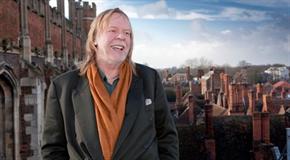All About Anderson, Rabin & Wakeman
As you might guess, Yes is mentioned a lot in this interview. Jon Anderson, who co-founded the seminal progressive rock band with Chris Squire in the late ’60s, had fronted every version of Yes until 2008 when his bout with asthma resulted in the band canceling a planned tour. Yes eventually returned to the road, sans Anderson.
Rabin entered the world of Yes in 1982 and was one of the driving forces behind the band’s resurgence that included the albums 90125 and Big Generator along with singles such as “Owner Of A Lonely Heart,” “Shoot High Aim Low” and “Rhythm Of Love.” Rabin left Yes in 1995.
Larry Magid ’s past achievements include producing national and international tours for The Allman Brothers Band , Il Divo, Robin Williams, Stevie Wonder, Bette Midler and other major acts. Magid co-produced the Philadelphia side of 1985’s Live Aid and produced 2005’s Live 8 in Philly.
A key component of Anderson, Rabin & Wakeman (ARW) is Brian Lane, who not only was Yes’ longtime manager but he handled Anderson, Bruford, Wakeman and Howe, as well as supergroup Asia. Turns out Lane is the lynchpin in launching Anderson, Rabin & Wakeman.
Although Magid and Rabin chatted with Pollstar last week, the Q&A is actually drawn from two separate conversations with the concert industry pro speaking with us one day, Rabin 24 hours later.

How did this project come together?
Rabin: I had a memorial for Chris Squire at my house. He had been talking to me about getting together with the band, with Yes, for a number of years. But I’ve been doing film scoring, been very busy and loving that. So it’s just something I wasn’t into at the time. Plus, I didn’t want to be involved without Jon being the singer. Then Jon and I started talking about three or four years ago. He started coming to a couple of my orchestra sessions. We started … getting together again after a long time.
Rick and I had always promised ourselves after The Union Tour that we wanted to play together. That’s kind of how it all started. Larry was very interested in getting involved. It just kind of got together from there.
Larry, what was your reaction when Brian Lane told you about bringing Anderson, Rabin and Wakeman together?
Magid: Obviously, I was interested in the whole thing. Trevor, Rick and Jon – I had great relationships through the years. It’s fun to work with them. At this point in my life, that’s what you look for. Something that is interesting or fun. I thought this had components of possibly being something that would make an impact.
Your involvement with Yes goes back to when the band first toured the U.S.
Magid: The first date they ever played [in the U.S.] was on a show I did … back in the ’70s. They were a $500 opening act [for Jethro Tull]. … They were great. An interesting thing about this group is through the years [Yes] always seemed to attract really good players. In 1991, ’92 there was The Union Tour with eight of them. And it was absolutely great.
Is this project more about new music or the Yes legacy or a combination?
Rabin: It actually started purely just to do new music. We started working on that. Then the touring aspect came up. That seems to have taken over and we’ll end up releasing new music. It started one way and ended up the other.
Have situations like this – projects taking on their own lives and going in unexpected directions – happened often in your career?
Rabin: Not this way. The idea of just getting together to tour was never a consideration. … It was just to do some new music.
When Jon Anderson, Bill Bruford, Rick Wakeman, and Steve Howe toured and released an album and toured in 1989-1990, there was some legal wrangling between the group and the Yes camp as to how that tour could be presented. Has there been any conflict between Anderson, Rabin & Wakeman and today’s Yes?
Magid: Not at all. That’s really the genesis of what this tour is. The Anderson, Bruford, Wakeman, and Howe tour was every bit as successful as a Yes tour. When you’re younger, you have legal ramifications, you want to argue or whatever. Certainly this isn’t Yes. It’s not meant to be even though it’s going to be an evening of Yes music redefined and updated. When you listen to some of the older albums, the extended playing on these albums is as good as any group. These guys can play. The only disappointment I have is that they’re not in the Rock and Roll Hall of Fame amongst the great names in music. This was a band that started a whole different way of presenting music … whether you want to call it “prog rock” or “progressive rock.” It came out of nowhere. The musicians were terrific. That alone, in my way of thinking, should enable them to be recognized and hopefully they will be sometime. The music holds up.

Do you think the Rock Hall has been somewhat biased against progressive rock?
Magid: Absolutely. It took Genesis a while to get in. As much as I really respect the board and the people in the Rock and Roll Hall of Fame, these groups haven’t been recognized. As a fan and a business person, I think they’re more than deserving. Hopefully at some point, but the longer you wait, the less the younger people will remember them.
Trevor, up until now, have the three of you been collaborating long distance via the internet, or have any of you had any face-to-face time?
Rabin: Rick and I have been communicating through the net. Jon and I, partly through the net and then he’s been coming here quite often.
Is creating music with Jon and Rick a visual situation similar to composing music for film?
Rabin: Film is an entirely different kind of thing. For the most part, what I really like about it is you visit different genres all the time. Very often it will be banjo, dobro, bass, and other times it will be almost all soft piano and bass. What I’ve been doing is large, orchestral scores. What we’re doing is entirely different.
Considering the wealth of musicians that have been members of Yes, is there a possibility that there might be other groupings formed from the band’s legacy?
Magid: Speaking to everyone, and to Brian, I asked what the commitment was. I asked if this was going to be a tour, make as much money as we can and disappear? The three guys have made a commitment to each other to see this thing through to whatever it will become. But who knows? You can never tell the future. I was surprised when I got the call. I hadn’t spoken to Brian in several years. Then, speaking to Trevor and Rick, they were so positive that it would have been hard for me to say I had done enough. … I’ll just leave this open to anything can happen. I would have liked to have seen some of the other [progressive] groups have some recognition. We lost Keith Emerson. For some reason he just didn’t have the proper outlet. He certainly had a fertile and creative manner in presenting his music. To me, Yes was head and shoulders above everybody as far as musicianship.
And Yes has lost Chris Squire.
Magid: One of the things Rick had said to me was that the passing of Chris Squire got him thinking of doing this or something like it, to try to get his friends to play together one more time. We’re all getting a little older.
I’m getting that feeling from some of the legacy bands that are still touring – that they want to keep playing for fans as long as they are able to.
Magid: The sad thing is, when you think about it, the groups broke up [when the members] were in their 20s, instead of having the foresight to say, “You know what? Let’s just take a break from each other then come back.” But that’s all hindsight.

But even Yes had the foresight to take a break. Like when the band paused in the mid ’70s for each member to do a solo album.
Magid: After The Union Tour with the eight of them, it was hard to keep that momentum up. There was talk of doing a tour with ELP opening up, or combining the groups in some fashion. But at that point the success of the group attracted so many managers. So if there were eight guys in the group, there were five managers. It became unwieldy.
And Brian is the original manager. [He’s] a unique individual. He was innovative in his own right. When there were legal issues or whatever, he had the foresight to put Anderson, Bruford, Wakeman, and Howe together, have the record company and the promoters present it in a manner that ensured their success. Brian played a big part over the years.
But when you’re young, everybody makes mistakes, makes errors in judgement. None of us are fortune tellers. We can’t see the forest for the trees, sometimes. Your emotions run high, or higher when you’re younger. At that point in our lives, none of the people in the business … whether it’s this band, managers, agents [or] record company executives, thought we were still going to be relevant in some fashion.
Trevor, after decades of making music, what inspires you today?
Rabin: With film, the freedom to do all kinds of different music, different genres. Thinking purely musically and not worrying about the A&R of things. … I did a kind of instrumental album about two years ago. At first there was talk of doing a record deal. I said, “I actually don’t want to do a record deal because I don’t want anyone to have any input into it and sway it off of where it will freely and naturally go.” Consequently, it came out exactly the way I wanted it. Then I did the record deal.
I think film has freed me up [for] what we do now. A lot of our arrangements will be different because of that.
How are the rearrangements of classic Yes songs coming along?
Rabin: That’s going to be a big part of what we’re doing. We really wanted to look at them in different ways, find different ways of approaching them. Really look at them without any preconceived ideas of where they’ve been, what they have been. Obviously, they are what they are. We’re not going to, hopefully, ruin them. (laughs)
What is it like to write with Jon?
Rabin: It’s always been very interesting with Jon. How it’s always been with me is I would write an idea and flush it out pretty substantially. I might have a full lyric written but then Jon will come in, do his thing and keep some of it, then go over it, start parts again. But it’s never been something where we start from scratch. It’s always been based on an idea.

Do you see this as a one album/one tour project or will Anderson, Rabin & Wakeman continue?
Rabin: I think the intention is to keep going. Personally speaking … when I got into film I didn’t want to play another Yes song for a little while after, I dunno, 1,000 shows. So I just, I guess, naively got into film and was lucky enough to have a great client very early on in Jerry Bruckheimer. … I thought I’d do a film or two and then get back on the road. 15 movies later, I’m now getting back on the road. So who knows what the future will bring? There are so many things we want to explore. I think it’s going to be longer than six months.
Is it too early to ask about the stage design for the upcoming tour?
Magid: We’re going to have a very nice presentation. It’s not going to be a minimalistic approach. It’s not going to be over the top. Jonathan Smeeton, whose mind is near genius, is going to do the stage production and lighting. The one thing we talked about is that the music is still viable and the approach is still strong that we don’t have to make everything gaudy. We need to make three personalities come through, have [fans] enjoy themselves, and not distract them. We’re putting together a strong presentation.
Larry, having been involved with Yes through the years, as a promoter as well as a fan, what’s your favorite Yes song?
Magid: If I had to choose one song, it might be “Owner Of A Lonely Heart.”
What happened on The Union Tour was … they made good music, it was great. It wasn’t what we thought it was actually going to be with one guy playing with two other guys [and] another guy walking on. They all wanted to play together. For an innovative band like that, they had enough hits to sustain the entire show. It just moved, which is what I think is going to happen here as well.
But that’s one song that I still enjoy. Personally, I think the music still holds up. As you get older you hear things differently. That’s not just with this group. … That’s one of the great things. You can still enjoy the music that was part of your life and hear it in so many different ways. And you don’t get tired of it.
What can you tell us about the album and tour that hasn’t yet been said?
Rabin: When Chris would say to me over the years, “Come on the road,” it would be leaving my “desk job,” is how you would put it. So I guess I’m getting on the street, so to speak. I haven’t played for so long live, and that was something which I did all my life and now I’m doing it again. I can’t wait for it and I have no clue what it’s going to be like.

Upcoming Anderson, Rabin & Wakeman shows:
Oct. 4 – Orlando, Fla., Hard Rock Cafe / Hard Rock Live
Oct. 6 – Hollywood, Fla., Seminole Casino Hollywood
Oct. 7 – Clearwater, Fla., Ruth Eckerd Hall
Oct. 9 – Durham, N.C., Durham Performing Arts Center
Oct. 10 – Atlanta, Ga., Fox Theatre
Oct. 12 – Pittsburgh, Pa., Heinz Hall For The Performing Arts
Oct. 14 – Bethlehem, Pa., Sands Bethlehem Event Center
Oct. 15 – Glenside, Pa., Keswick Theatre
Oct. 16 – Glenside, Pa., Keswick Theatre
Oct. 19 – Boston, Mass., Wang Theatre – Citi Performing Arts Center
Oct. 21 – Wallingford, Conn., Toyota Oakdale Theatre
Oct. 22 – Huntington, N.Y., The Paramount
Oct. 24 – Montclair, N.J., The Wellmont Theater
Oct. 26 – Red Bank, N.J., Count Basie Theatre
Oct. 28 – Atlantic City, N.J., Borgata Hotel, Casino & Spa / Event Ctr.
Oct. 29 – Akron, Ohio, Goodyear Theater
Nov. 1 – New York, N.Y., Beacon Theatre
Nov. 2 – Buffalo, N.Y., UB Center For The Arts Mainstage
Nov. 4 – New Buffalo, Mich., Four Winds Casino
Nov. 5 – Chicago, Ill., Chicago Theatre
Nov. 7 – Nashville, Tenn., Schermerhorn Symphony Center
Nov. 9 – St. Louis, Mo., Fabulous Fox Theatre
Nov. 11 – New Orleans, La., Saenger Theatre
Nov. 12 – San Antonio, Texas, Majestic Theatre
Nov. 14 – Austin, Texas, Austin City Limits Live at The Moody Theater
Nov. 16 – Denver, Colo., Paramount Theatre
Nov. 17 – Salt Lake City, Utah, Capitol Theatre
Nov. 19 – Las Vegas, Nev., Pearl Concert Theater
Nov. 20 – Phoenix, Ariz., Celebrity Theatre
Nov. 22 – Los Angeles, Calif., Orpheum Theatre
Nov. 25 – San Francisco, Calif., SF Masonic
Nov. 27 – San Jose, Calif., City National Civic
Nov. 29 – Portland, Ore., Arlene Schnitzer Concert Hall
March 12 – Cardiff, Wales, Motorpoint Arena Cardiff
March 13 – Birmingham, England, Symphony Hall
March 15 – Brighton, England, Brighton Dome
March 16 – Bournemouth, England, Windsor Hall
March 19 – London, England, Eventim Apollo
March 21 – Nottingham, England, Royal Concert Hall
March 22 – Edinburgh, Scotland, Usher Hall
March 24 – Glasgow, Scotland, Glasgow Royal Concert Hall
March 25 – Manchester, England, O2 Apollo Manchester
March 27 – Brussels, Belgium, Cirque Royal
March 28 – Utrecht, Netherlands, TivoliVredenburg
For more information, please visit Anderson, Rabin & Wakeman’s website, Facebook page and Twitter feed.
 Daily Pulse
Subscribe
Daily Pulse
Subscribe

